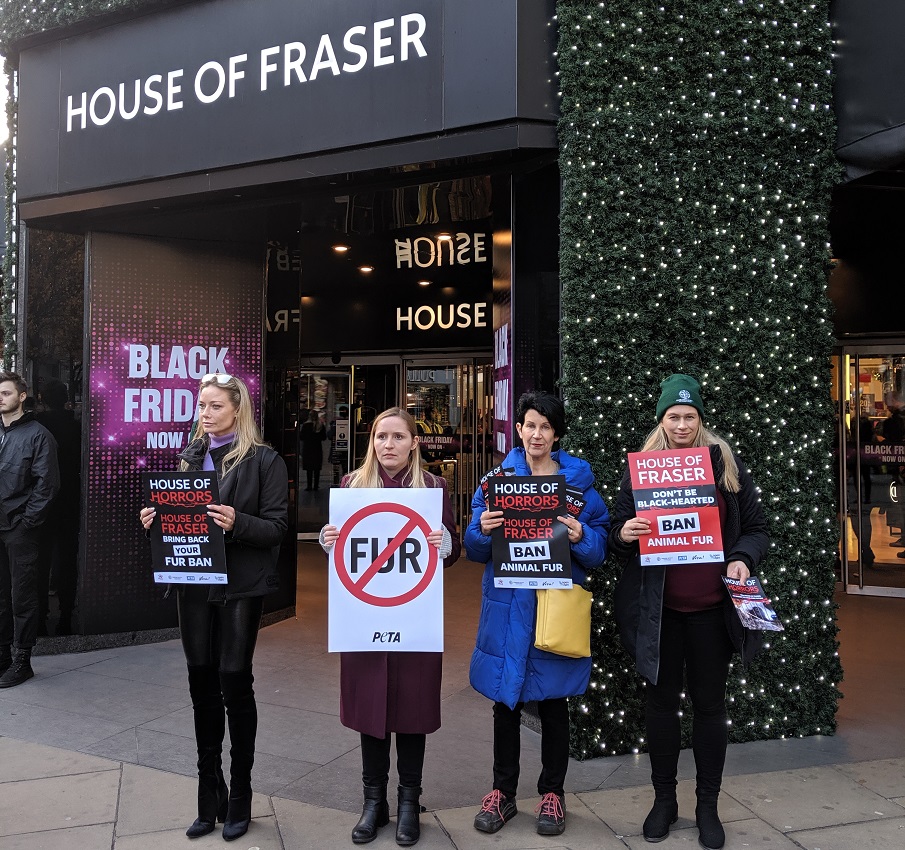#FurFreeBritain campaigners urge House of Fraser to drop cruel fur at Shareholders Meeting

Campaigners from the #FurFreeBritain alliance of NGOs today urged attendees at House of Fraser’s General Shareholder Meeting in London, to reinstate the retailer’s broken fur-free policy and stop selling fur-trimmed garments from factory-farmed raccoon dogs, rabbits and foxes or from coyotes caught in cruel leg-hold traps.
House of Fraser’s decision in November this year to start selling fur again after being fur-free for a decade, has been met with widespread consumer condemnation and disgust, with many customers taking to twitter to pledge a boycott of the company. Although the offending fur items were initially removed from online and in store, they subsequently crept back in at selected stores and online, and House of Fraser has now publicised a new and much-ridiculed policy claiming it only stocks fur from so-called “responsible” sources. That, say campaigners, is an oxymoron as all fur comes from animals who have spent their entire lives in small, barren, wire-floored cages, denied adequate space or environmental enrichment to live a meaningful life before being electrocuted or gassed, or from animals like coyotes wild-caught in cruel leg-hold traps. Both fur farming and leg-hold trapping are banned in the United Kingdom on animal welfare grounds.
During the meeting, the Executive Director of Humane Society International/UK spoke to shareholders urging them to rethink the company’s u-turn on being a compassionate retailer, noting that as recently as 2018 House of Fraser’s Head of Sustainability gave evidence to a House of Commons Select Committee Inquiry confirming that its customers are very firmly against fur and don’t want it to be sold by the store.
House of Fraser was dubbed House of Horrors by campaigners for selling jackets made by Canada Goose, Parajumpers, Pyrenex and Mackage using real fur. The decision appears to have been introduced sometime after the company was bought out by Sports Direct owner Mike Ashley.
Claire Bass, UK Executive Director of Humane Society International says: “House of Fraser customers have made it clear they don’t want anything to do with the cruel fur trade, so it’s shocking that the retailer has ditched its long-standing fur-free policy, a move that’s out of touch with public and fashion industry opinion. Its recent takeover by Sports Direct’s CEO Mike Ashley appears to have resulted in the retailer abandoning its morals and instead buying into the fur industry’s fantasy world of ‘responsibly sourced fur’. The truth is there is no such thing; all fur is cruel, there is nothing responsible about foxes going mad in tiny wire battery cages, raccoon dogs being anally electrocuted, or coyotes being shot in leg-hold traps. We are urging House of Fraser shareholders to do the right thing for animals, and animal-loving customers, by reinstating its fur-free policy.”
Emily Wilson, FOUR PAWS UK Head of Programmes says: “We are appalled that fur has reappeared in House of Fraser. The public has spoken out in disgust at this, yet profit margins once again seem to take precedence over animal welfare. We cannot allow this to continue and urge every retailer to ban the sale of fur. We have long stood alongside fellow NGOs in calling for a resolute and final ban on the sale of all fur items and hope that as we enter a new year we can do so with a final ban on the sale of all fur items. We hope that House of Fraser and any other retailer see sense and put an end to this senseless abuse of animals.”
Elisa Allen, PETA UK, says: “Most shoppers object to killing animals in painful ways for frivolous fashion items, and many are ready to boycott any retailer that still supports the cruel fur trade. House of Fraser must reinstate its no-fur policy immediately – otherwise it will find its stores empty of customers this winter.”
The moves sees House of Fraser strangely out of step not just with its customers’ sentiments but also with the increasing number of fashion designers and retailers who are dropping fur cruelty. In the last two years alone Prada, Gucci, Versace, Michael Kors, Jimmy Choo, DKNY, Burberry, Chanel and other high-profile brands have announced fur-free policies. In addition, online fashion retail giants Net-A-Porter and Farfetch have introduced no-fur policies.
The UK banned fur farming almost two decades ago in 2000 on ethical grounds, but since then has allowed imports of more than £820 million worth of fur from overseas, including Finland and China. These UK fur imports are a double standard that the #FurFreeBritain campaigners are urging the government to end, by implementing a UK fur sales ban.




